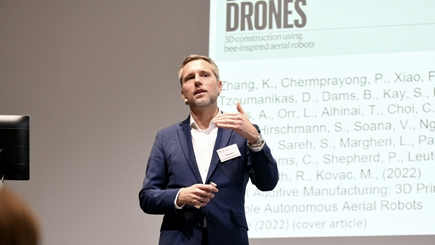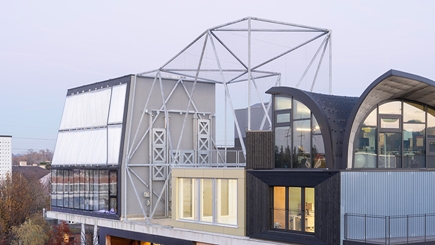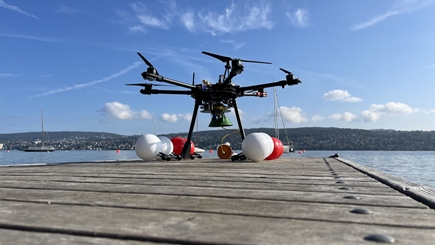New Empa competence center in Schaffhausen
Applied research for sustainability robotics
Schaffhausen is becoming a region for sustainability robotics applications: Thanks to a new partnership between Empa and the canton of Schaffhausen, drones and intelligent machines will be tested and further developed here under real-life conditions – bridging the gap between research and industry and benefiting the environment.


The drone buzzes briefly in the air before suddenly disappearing into the waters of the Rhine. Has it crashed? No, because the researcher wearing 3D glasses is still calmly moving her fingers over the controls. And suddenly, the dripping drone reappears with a water sample and lands gently on the shore. Tests like this are still a long way off in Schaffhausen. But they are soon to become part of everyday life here: as a mosaic piece in the global research and application of future technologies.
At least that's how Mirko Kovac sees it. Kovac is head of the Laboratory for Sustainability Robotics at Empa in Dübendorf and professor at EPFL, and is one of the leading figures in the new field of sustainability robotics. This discipline combines physical AI to develop new types of robots and enable new areas of application that can provide significant support in maintaining and improving infrastructure or protecting the environment. His goal in this new field of research is for Switzerland to take a leading position, with Schaffhausen playing a key role as a business location in this dynamic technological environment where future technologies are being investigated. To this end, Empa already has concrete plans to establish a competence center for sustainability robotics in Schaffhausen as an extension of its own test and application infrastructure in the laboratory and in the DroneHub and the planned AeroAquaArena in Dübendorf.
A new competence center for sustainability robotics

Mirko Kovac and his team are still testing the robots in the laboratories at Empa and EPFL. Soon they will move into an outdoor setting in the new DroneHub atop of NEST in Dübendorf. Well protected in a kind of cage, the robots will take their first steps or flights. Kovac's aim is not only to investigate the extent to which drones and other robots can take on tasks in the field of building inspection, maintenance, and repair that are too dangerous for humans, but also to develop a diverse portfolio of robots and drones for collecting environmental data in forests and wetlands. But all this is still under controlled parameters. Kovac: “What if the wind is stronger, the current not as expected? Before we deploy our robots in extreme conditions in Greenland or in the urban canyons of metropolises, for example, we have to put them through their paces – even outside the laboratory.”
By establishing a competence center for sustainability robotics in Schaffhausen, Empa aims to transfer its research from the laboratory to real-world environments – in close cooperation with local companies, authorities, and educational institutions. Schaffhausen will thus become a hotspot for applications of sustainability robotics and technologies designed to provide long-term support for the environment, infrastructure, and society. "We find the best conditions here: The internationally unique biodiversity with the Rhine and Randen, the strong economic location with its many high-tech companies, the short distances and the support from economic development agencies and public authorities are exactly what we need to set up such a center,“ says Kovac. ”We have the conditions here to gain experience with our robots – whether they fly or move on land or in water. And at the same time, we can enter into partnerships with local industry." This could be software manufacturers, injection molders, sensor developers, or development departments of corporate headquarters based here. Initial discussions have already taken place and will be further intensified in the coming months. Ideas have also been exchanged with the administration and local schools. So that ideas and projects can grow.
The next steps

The goal of Empa and the canton of Schaffhausen is to work closely with local companies over the next five years to develop and validate robotics solutions in the field of environmental sensor technology and apply them in real-world environments, for example by monitoring water quality or measuring biodiversity. To this end, suitable locations in the canton of Schaffhausen will be equipped with sensor technology for testing applications. The competence center is intended to serve as a hub for innovation and research in the field of sustainability robotics and to facilitate knowledge transfer between research and local companies or organizations. With its support for the competence center, the canton of Schaffhausen is making an important contribution to ensuring that the development of the center and feasibility studies can proceed.
Prof. Dr. Mirko Kovac
Sustainability Robotics, Empa
Aerial Robotics Lab, Imperial College London
«Sustainability Robotics», «School of Architecture, Civil and Environmental Engineering», EPFL
Phone +41 58 765 46 89
Petra Roost
Wirtschaftsförderung Kanton Schaffhausen
Phone +41 52 674 03 03
-
Share






